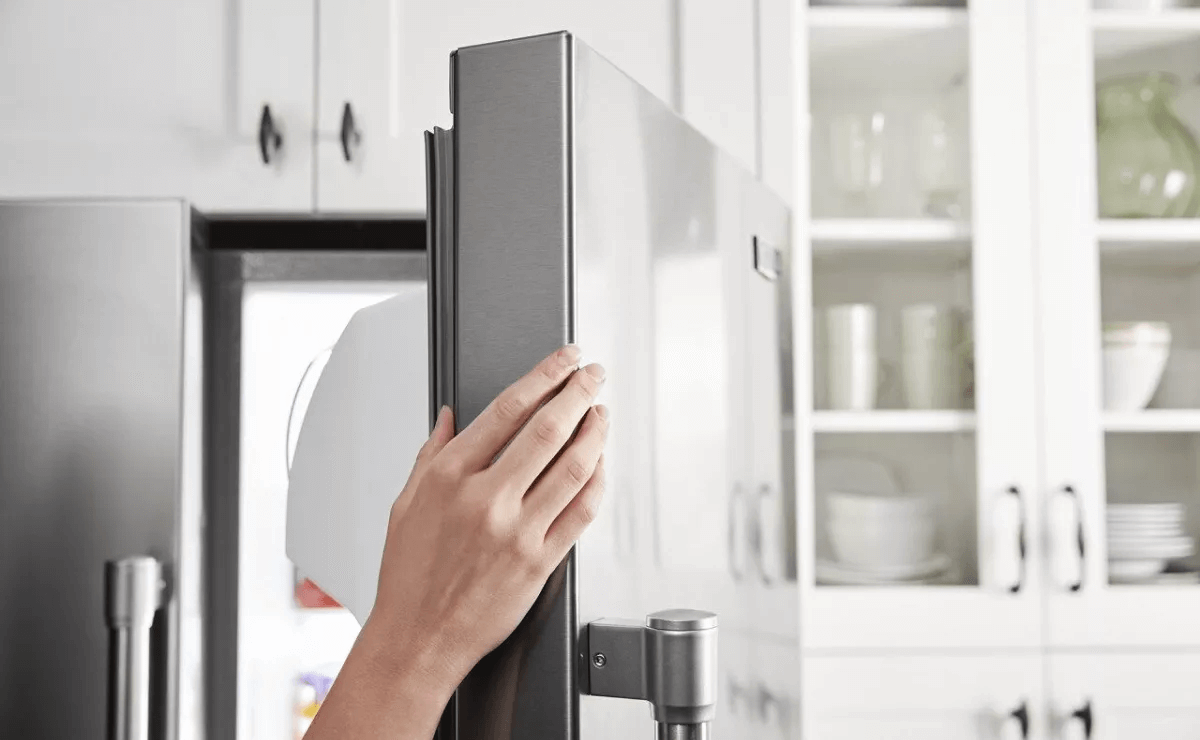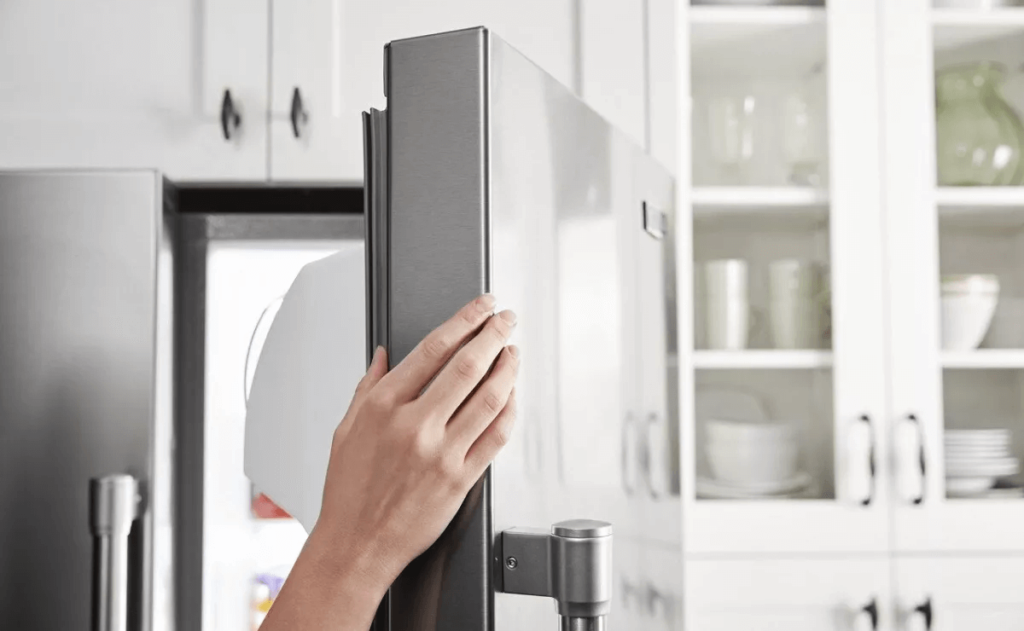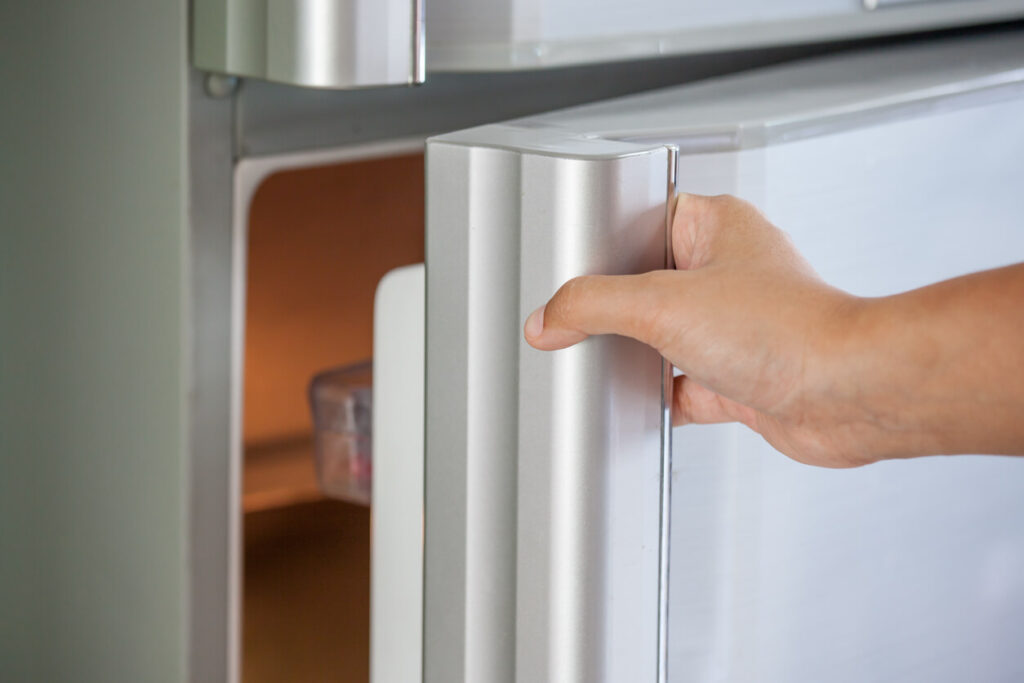

Is your trusty refrigerator suddenly making more noise than your cousin’s band at a garage concert? It’s not just an annoyance; a noisy fridge can be a sign of trouble brewing in the kitchen. But before you panic and call the repairman, let’s explore some quick fixes that can bring back the peace and quiet.
Why is Your Refrigerator Making Noise?
Before we dive into solutions, it’s essential to understand why your fridge is causing a ruckus in the first place. Several factors can contribute to the clamor:
- Compressor Operation: The compressor is the heart of your refrigerator, and it’s normal for it to hum and vibrate. But if it starts sounding like a jet engine, something’s amiss.
- Condenser and Evaporator Fans: These fans circulate air within the fridge. If they’re off-balance or dirty, you’ll hear a commotion.
- Defrost Timer: A noisy ticking sound could be a malfunctioning defrost timer.
- Loose Components: Over time, parts can become loose or misaligned, leading to strange noises.
Quick Fixes to Restore Peace and Quiet
Now, let’s tackle the issues one by one. You might be surprised at how simple some of these solutions are.
Clean Those Coils!
Dirty condenser coils can make your fridge work harder, leading to more noise. It’s like asking a toddler to sit still at a birthday party – not gonna happen!
Solution: Grab your vacuum cleaner and gently clean the coils at the back or underneath the fridge. Keep the party noise down, baby!
Level Up
If your fridge isn’t level, it can rock and roll, creating quite the spectacle. To keep it grounded, make sure it’s sitting pretty.
Solution: Adjust the fridge’s leveling legs to ensure it’s on solid ground. No more fridge dance-off!
Tighten Up
Just like a loose screw on a roller coaster, loose parts in your fridge can be a wild ride. Check for any loose components and secure them.
Solution: Grab your trusty screwdriver and tighten up any screws, bolts, or fasteners. You’re the conductor of this repair train!
A Little Lubrication
If your evaporator or condenser fan is causing a racket, a bit of lubrication can help them find their chill.
Solution: Use a few drops of oil on the fan’s bearings. No more squeaky serenades!
The Defrost Dilemma
If you hear a ticking sound, it might be the defrost timer acting up. Time to tame it!
Solution: Turn the defrost timer manually. If the noise stops, you’ve just defeated the ticking monster!
Check for Icy Intruders
Frost buildup can put a fridge’s fan on edge, leading to unnecessary noise. Think of it as an unwelcome guest at a library.
Solution: Defrost your fridge to get rid of excess ice. It’s like evicting that noisy neighbor!
The Mystery of the Food Containers
Sometimes, items inside the fridge can rattle and hum. Are your leftovers getting up to mischief?
Solution: Secure food containers and ensure they’re not touching each other. No more midnight food parties!
More In-Depth Solutions

While the quick fixes above should address most noise issues, some problems may require a more in-depth approach.
Check the Evaporator Fan
If your fridge sounds like a miniature hurricane is brewing inside, the issue may lie with the evaporator fan. This fan, located inside the freezer, circulates cold air. When it’s out of balance or its blades are damaged, you’ll get a symphony of unwanted noise.
Solution:
- Unplug your fridge to ensure safety.
- Access the back panel inside the freezer and remove it.
- Inspect the fan for any visible damage or ice buildup.
- If you notice any issues, replace the fan motor or blades as necessary.
Investigate the Compressor
A malfunctioning compressor can create a buzzing or rattling noise that’s hard to ignore. If this is the source of your troubles, you’ll need to act swiftly.
Solution:
- Unplug your fridge to prevent any electrical mishaps.
- Access the back of your fridge where the compressor is located.
- Listen closely to the compressor while it’s running. If it’s excessively noisy, it may be failing.
- Consult a professional technician to evaluate and potentially replace the compressor.
Inspect the Water Inlet Valve
If your fridge has a water and ice dispenser, a noisy water inlet valve could be the culprit behind your kitchen concert.
Solution:
- Locate the water inlet valve, usually situated at the back of the fridge.
- Check for any visible damage or loose connections.
- If you find issues, replace the valve or tighten any loose connections as needed.
Maintaining a Quiet Refrigerator
Now that you’ve silenced the noisy beast, let’s talk about keeping it that way. Regular maintenance can help ensure your fridge stays quiet and functional.
Keep It Clean
Dust and debris can accumulate around the condenser coils, making your fridge work harder and generate more noise. Regularly cleaning them is essential.
Solution:
- Turn off the fridge and unplug it for safety.
- Locate the condenser coils (usually on the back or beneath the fridge).
- Gently vacuum or brush away any dirt and dust. Do this every six months for optimal performance.
Monitor the Door Seals
If the door seals are damaged or worn out, your fridge will struggle to maintain the right temperature, leading to more noise.
Solution:
- Check the rubber gaskets around the fridge and freezer doors.
- Look for cracks, tears, or signs of wear.
- Replace damaged seals to ensure a proper, noise-reducing seal.
Organize Your Fridge
Clutter inside your fridge can lead to items rattling and creating noise. A well-organized fridge not only reduces noise but also helps you find items more easily.
Solution:
- Use containers or organizers to keep items tidy.
- Ensure that nothing is touching the back wall or each other.
- Periodically clean out expired items to maintain order.
Control the Temperature
Extreme temperature settings can lead to your fridge working harder than necessary. This extra strain can result in noise.
Solution:
- Keep your fridge between 37-40°F (3-4°C) and the freezer at 0°F (-18°C).
- Use a separate thermometer to verify the temperature and adjust the settings as needed.
When to Call a Professional

While these quick fixes and maintenance tips can address many refrigerator noise issues, there may come a time when you need to call in a professional appliance technician. Here are some signs that it’s time to make the call:
- Unusual or Persisting Noise: If the noise doesn’t subside despite your best efforts, it may indicate a more complex problem.
- Visible Damage: If you notice physical damage to components like the compressor or evaporator fan, professional help is crucial.
- Electrical Issues: Refrigerators are electrical appliances, and working on them without proper knowledge can be dangerous. If you suspect an electrical problem, call a pro.
- Warranty Concerns: If your fridge is under warranty, tampering with it may void the warranty. Consult a professional for any covered repairs.
Remember that refrigerator noise isn’t just a nuisance; it can signal underlying issues that, if left unattended, could result in costly repairs or premature appliance replacement. So, if your fridge is giving you more than cool refreshments, take action to restore the peace in your kitchen.
The Sound of Silence
A noisy refrigerator can disrupt the tranquility of your home, especially if it’s making unexpected and irritating sounds. While the quick fixes and maintenance suggestions covered so far can help keep your fridge in tip-top shape, there are some additional steps you can take to enjoy the sound of silence in your kitchen.
Insulate Your Refrigerator
If your refrigerator is particularly loud, consider insulating it. This can help reduce noise and maintain a peaceful ambiance in your home.
Solution:
- Purchase a refrigerator insulation kit, which typically includes foam panels.
- Measure the sides and back of your fridge, and cut the insulation panels to fit.
- Attach the panels to the sides and back of the refrigerator using the provided adhesive or clips.
- Ensure that the insulation doesn’t obstruct any vents or components.
Location, Location, Location
Sometimes, the placement of your refrigerator can impact the noise it makes. Ensure it’s not touching walls, cabinets, or other appliances, as this can create vibrations and increase noise levels.
Solution:
- Check the clearance around your refrigerator. There should be at least an inch or two of space on all sides for proper ventilation and to reduce noise.
Upgrade Your Fridge
If your refrigerator is getting up there in years, it might be time to consider an upgrade. Older models tend to be noisier due to outdated technology.
Solution:
- Research and invest in a modern, energy-efficient refrigerator with advanced noise-reduction features.
- Look for models with quieter compressors and better insulation.
Regularly Inspect and Maintain
Prevention is the best cure for noise. Regularly inspect your fridge and maintain it to ensure it stays as quiet as a whisper.
Solution:
- Perform the quick fixes and maintenance routines outlined earlier in this article on a regular schedule to keep your refrigerator in top shape.
The Final Chill
A noisy refrigerator is a nuisance that nobody should have to endure. By following the quick fixes, more in-depth solutions, and maintenance tips provided in this article, you can silence the symphony of sounds that may be emanating from your kitchen.
Remember that when dealing with appliance repairs, safety should be your top priority. Unplug your refrigerator before attempting any fixes, and if you’re uncomfortable with any task, don’t hesitate to seek the assistance of a professional technician. It’s better to enjoy a quiet kitchen and a reliable fridge than to risk causing further issues.
Your refrigerator should hum with efficiency, not create a cacophony of chaos. With these solutions, you’ll be well on your way to restoring the peace and quiet in your kitchen, allowing you to enjoy a harmonious home once more.
Frequently Asked Questions (FAQs) About Noisy Refrigerators
We understand that dealing with a noisy refrigerator can be quite an inconvenience. To help you address your concerns and find solutions to your fridge-related noise issues, we’ve put together this list of frequently asked questions and answers.
1. Why is my refrigerator making so much noise?
Refrigerators can make various noises due to different components and issues. Common sources of noise include the compressor, fans, defrost timer, or loose components. Identifying the specific noise source is key to addressing the problem effectively.
2. Can I ignore the noise, or should I address it immediately?
While some refrigerator noises are harmless, others can indicate underlying issues. Ignoring persistent, unusual noises can lead to costly repairs down the road. It’s best to address the issue promptly to prevent further damage.
3. How can I determine the source of the noise in my refrigerator?
To pinpoint the source of the noise, start by unplugging the refrigerator, safely removing any interior or exterior covers, and visually inspecting components like fans, compressors, and coils. You can also listen closely while the fridge is running. If you’re unsure, it’s a good idea to consult a professional technician.
4. Are there any common quick fixes for refrigerator noise?
Yes, several common quick fixes can address refrigerator noise. These include cleaning the condenser coils, ensuring the fridge is level, tightening loose components, and lubricating fans. Refer to the article above for detailed instructions.
5. When should I call a professional technician for help?
You should consider calling a professional technician if:
- The noise persists even after trying quick fixes.
- You notice physical damage to components like the compressor or evaporator fan.
- You suspect an electrical issue.
- Your refrigerator is still under warranty, as tampering may void the warranty.
6. Can I insulate my refrigerator to reduce noise?
Yes, you can insulate your refrigerator to reduce noise. Insulation kits with foam panels are available for this purpose. Be sure to measure and install the panels properly to avoid obstructing vents or components. Refer to the article for more details.
7. Are there any refrigerator models known for being quieter?
Yes, many modern refrigerator models are designed with noise reduction features. Look for models with quieter compressors and improved insulation. When shopping for a new refrigerator, check for noise levels in the product specifications.
8. What should I do if my refrigerator is under warranty and making noise?
If your refrigerator is under warranty and experiencing noise issues, it’s best to contact the manufacturer or an authorized service provider. Tampering with the appliance on your own may void the warranty.
9. Can improper placement of the refrigerator cause noise?
Yes, the placement of your refrigerator can affect the noise it makes. Ensure your fridge is not in direct contact with walls, cabinets, or other appliances, as this can create vibrations and increase noise levels. Leave at least an inch or two of space on all sides for proper ventilation.
10. How often should I perform maintenance on my refrigerator to prevent noise issues? Regular maintenance is essential to prevent noise issues. Cleaning condenser coils, checking and maintaining door seals, organizing the fridge, and monitoring temperature should be done at least every six months. Performing these tasks on a regular schedule can help keep your refrigerator quiet and efficient.
